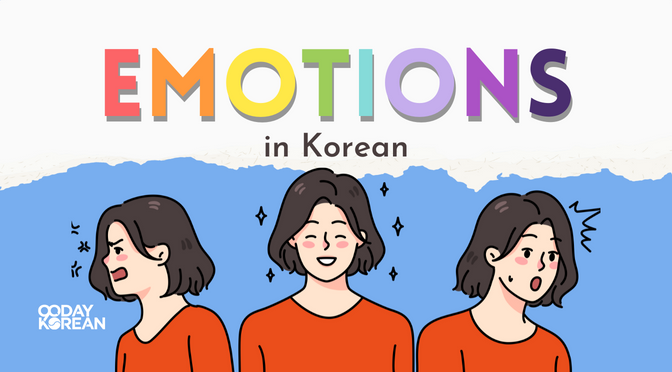In this article, you will be learning the words for different emotions in Korean. Nearly every minute that you are awake, you feel and express some type of emotion. You can feel good or sad. It’s a natural part of everyday life, and therefore it’s important to know how to communicate those emotions.
Thus, even if expressing emotions in your mother tongue is something you don’t normally do, you should take this opportunity to start learning how to communicate your emotions in Korean. This helps in gaining more knowledge of Korean words and Korean pronunciation.

Learning Korean words for emotions and how Koreans tend to express them leads to a better understanding of the culture as a whole. Now, let’s begin to define Korean words related to emotions!
How to say “emotions” in Korean?
“Emotion” in Korean is 감정 (gamjeong). To be specific, if you want to say emotions and stress in the plural form, you may add -들 (deul) to the end of the noun. This way 감정들 (gamjeongdeul), the word for “emotions” in Korean. However, oftentimes you can drop -들 (deul) from the word, and people will still know you mean the noun in plural form.
The Korean word for “mood” is 기분 (gibun). It can also be used to mean “feeling.”
How do Koreans express their emotions?
Koreans have different levels of speech chosen in every situation, as well as important Korean concepts such as nunchi. Due to these cultural aspects, it may be difficult to understand how Koreans express their emotions – or whether they do so. It gets even more confusing as the Korean language doesn’t have adjectives, so to speak.
In the most formal situations, it may be difficult to express or describe how you feel to remain respectful. And even in casual situations, Koreans may be so invested in keeping up the harmony that especially expressing negative emotions gets harder.
Using Korean adjectives
Native Koreans rely more on Korean exclamations to express their emotions rather than using the adjectives themselves. However, the Korean language has a diverse range of descriptive verbs that can be turned into Korean adjectives, displaying every emotion. That means to describe something in Korean, you need to conjugate a descriptive verb.
You can find the conjugation rules for descriptive verbs in the Korean adjectives article. Essentially, in the case of emotions, you are almost always making “I am” statement sentences. Note, though, that to do so, you will not use the be-verb but rather the present tense verb ending.
Learning how to express and communicate these emotions in Korean can help clear out possible misunderstandings. It will help you bond more closely with Koreans and will be one step closer to fluency in the Korean language.

List of different vocabulary for emotions in Korean
Below, you’ll find a list of words for various emotions in Korean. You may have heard some of these in K-dramas or K-pop songs. Primarily, emotions can be categorized into positive and negative emotions. In positive emotions, you have feelings like happiness, whereas, on the negative side, you may have fear or sadness.
| English | Korean |
|---|---|
| Alive | 살아있다 (saraitda) |
| Angry | 화나다 (hwanada) |
| Annoyed | 짜증나다 (jjajeungnada) |
| Be in bad mood | 기분이 안 좋다 (gibuni an jota) |
| Be in bad mood | 기분이 나쁘다 (gibuni nappeuda) |
| Be in good mood | 기분이 좋다 (gibuni jota) |
| Bored | 심심하다 (simsimhada) |
| Busy | 바쁘다 (bappeuda) |
| Comfortable | 편하다 (pyeonhada) |
| Confused | 헷갈리다 (hetgallida) |
| Crazy | 미치다 (michida) |
| Dead tired | 영혼이 없다 (yeonghoni eopda) |
| Depressed | 우울하다 (uulhada) |
| Disappointed | 실망하다 (silmanghada) |
| Drained | 힘이 빠지다 (himi ppajida) |
| Embarrassed | 창피하다 (changpihada) |
| Energetic | 활기차다 (hwalgichada) |
| Excited | 기대 되다 (gidae dwoeda) |
| Exhausted | 지치다 (jichida) |
| Frightened | 무섭다 (museopda) |
| Furious | 속이 끓다 (soki kkeurda) |
| Furious | 몹시 화가나다 (mopsi hwaganada) |
| Glad, happy, excited, pleased | 기쁘다 (gippeuda) |
| Grateful, thankful | 감사하다 (gamsahada) |
| Happy | 행복하다 (haengbokada) |
| Hate | 싫다 (silta) |
| Hopeless | 가망이 없다 (gamangi eopda) |
| Humble | 겸손하다 (gyeomsonhada) |
| In love | 사랑에 빠지다 (sarange ppajida) |
| Jealous | 질투하다 (jiltuhada) |
| Jealous, envious | 부럽다 (bureopda) |
| Lively | 활발하다 (hwalbalhada) |
| Lonely | 외롭다 (woeropda) |
| Love | 사랑하다 (saranghada) |
| Nervous | 긴장하다 (ginjanghada) |
| Nervous | 긴장이 되다 (ginjangi dwoeda) |
| Proud | 자랑스럽다 (jarangseureopda) |
| Rejected | 거절하다 (geojeolhada) |
| Sad | 슬프다 (seulpeuda) |
| Satisfied, content | 만족하다 (manjokada) |
| Scared | 겁나다 (geopnada) |
| Scared, frightened | 무서워하다 (museowohada) |
| Silly | 유치하다 (yuchihada) |
| Sleepy | 졸리다 (jollida) |
| Sorry | 미안하다 (mianhada) |
| Surprised, amazed | 놀랍다 (nollapda) |
| Thankful | 고맙다 (gomapda) |
| Timid | 소심하다 (sosimhada) |
| Tired | 피곤하다 (pigonhada) |
| Uncertain | 확신이 없다 (hwaksini eopda) |
| Uncomfortable | 불편하다 (bulpyeonhada) |
| Unconfident | 자신없다 (jasineopda) |
| Unhappy | 불행하다 (buraenghada) |
| Unsatisfied | 불만스럽다 (bulmanseureopda) |
| Unsure | 확실하지 않다 (hwaksilhaji anta) |
| Worried | 걱정하다 (geokjeonghada) |
| Worried | 걱정되다 (geokjeongdwoeda) |
Different emotions in Korean
Now, let’s dive deeper into some of the words related to emotions in Korean below with related phrases. Knowing what they are and how to use them will help you sound more natural and native as you talk to your friends while in South Korea.
“To be angry” in Korean
The Korean word for “angry” is 화나다 (hwanada). Interestingly enough, this is actually not an adjective or a descriptive verb, it’s an action verb. Additionally, even when you use it in its past tense – 화났다 (hwanatda) – you are still talking about being angry at the moment.
Formally, you may say 화납니다 (hwanamnida) or 화났습니다 (hwanasseumnida). Politely, you may say 화나요 (hwanayo) or 화났어요 (hwanasseoyo). Casually, you may say 화나 (hwana) or 화났어 (hwanasseo).
짜증나다 (jjajeungnada), which means “to be annoyed,” acts similarly to the verb for angry, both in meaning and in how it gets used as an action verb.
“To be bored” in Korean
The Korean word for “bored” is 심심하다 (simsimhada). It specifically means the feeling of being bored and is rarely used to describe something as boring. You also cannot utilize it as a verb. However, you can use it to express frustration over boredom.
Additionally, unlike most other words on the list, 심심하다 is primarily a casual word. That means you shouldn’t use it outside of conversations with friends or people younger than you. In other words, it is only appropriate in situations where you can speak informally. Casually, you may say 심심해 (simsimhae).
“To be fun” in Korean
The word to use when something is fun in Korean is 재미있다 (jaemiitda). Many Koreans also use it when meaning “to be funny.” It’s originally a formal Korean word, actually, but you will often see it in a casual Korean conversation.
While fun itself is not considered an emotion, you can use this descriptive verb to express feeling joy or enjoyment over something. Thus, it’s a popular way for Koreans to express positive emotions.
Formally, you may say 재미있습니다 (jaemiisseumnida). Politely, you may say 재미있어요 (jaemiisseoyo). And casually, you can say 재미있어 (jaemiisseo). Besides saying something is fun or interesting or bringing you joy, you can also use 재미있다 to say you’ve had a great day.
For example, if you had fun today, you could say 오늘 재미있었어요 (oneul jaemiisseosseoyo), which means “Today was great” and also “Today was fun.” This is especially appropriate to use in situations where you are just finished hanging out with your friend and want to let them know you had a good time.
“To be glad” in Korean
The word for “glad” in Korean is 기쁘다 (gippeuda). It can also be used to describe feeling happy or excited, or pleased. Formally, you may say 기쁩니다 (gippeumnida). Politely, you may say 기뻐요 (gippeoyo). And casually, you may say 기뻐 (gippeo).
Their English translation is “I am glad.” The use of this emotion is quite limited and is mostly used in formal speeches rather than casual daily conversations.
“To be happy” in Korean
The Korean word for “happy” in Korean is 행복하다 (haengbokada). However, native Koreans avoid using this as it is a very uncommon phrase for “happy” and may sound like a poetic word.
Formally, you may say 행복합니다 (haengbokamnida). Politely, and in most situations, you may say 행복해요 (haengbokaeyo). And casually, you can use the informal Korean word 행복해 (haengbokae). All of these translate as the sentence “I am happy,” which is the primary way to express this emotion in Korean.
Interestingly enough, this is not the most common Korean word used to express feeling happy in spoken or casual conversations. Instead, on this list, you will find many other emotions that may be more fitting to use when you want to say you are happy. This particular word for happy is mainly used in situations with a lot of gravity.
“To be in love” in Korean
The expression for “to be in love” in Korean is 사랑에 빠지다 (sarange ppajida). In this case, it is actually used together with past tense rather than present tense.
Therefore, in formal Korean speech, you may say 사랑에 빠졌습니다 (sarange ppajyeosseumnida), in polite speech, you may say 사랑에 빠졌어요 (sarange ppajyeosseoyo), and casually you may say 사랑에 빠졌어 (sarange ppajyeosseo). All of these translate as “I’ve fallen in love.”
If you want to precisely say that you are in love in the present times, you may combine the descriptive verb with -어 있다 (eo itda). With this, you are describing that you are continuing an action that you have completed. As in, you have fallen in love, and now you continue to be in it.
“To be sad” in Korean
The word for “sad” in Korean is 슬프다 (seulpeuda). The formal Korean word you can use for it is 슬픕니다 (seulpeumnida). Politely, you may say 슬퍼요 (seulpeoyo). And casually, you may say 슬퍼 (seulpeo).
Sadness is a common emotion for all of us, felt in various different situations to various degrees. You may be sad because someone close to you died, but you may also be simply sad over a movie you just watched.
However, other similar Korean words may be better suited for some occasions when you feel some type of sadness. For example, if you’re in an extremely sad mood, 우울하다 (uulhada), which means to feel depressed, or to feel blue, is the most common expression used in place of 슬프다 (seulpeuda).
Wrap Up
And here you go! Now you know some essential Korean vocabulary for when you want to express your feelings, moods, and emotions in Korean. You’ve also learned more about this new language and how some of this central vocabulary is used in action.
As you learn Korean and become more accustomed to Korean culture, it will also become increasingly easy to know just how to show your emotions in any situation. How do you express emotions and moods? Let us know below in the comments!
Next, why not learn other Korean words through our article on Korean nouns?
The post Emotions in Korean – Words to express how you feel appeared first on 90 Day Korean®.
 Learn to read Korean and be having simple conversations, taking taxis and ordering in Korean within a week with our FREE Hangeul Hacks series: http://www.90DayKorean.com/learn
Learn to read Korean and be having simple conversations, taking taxis and ordering in Korean within a week with our FREE Hangeul Hacks series: http://www.90DayKorean.com/learn
Korean lessons * Korean Phrases * Korean Vocabulary * Learn Korean * Learn Korean alphabet * Learn Korean fast * Motivation * Study Korean


Recent comments